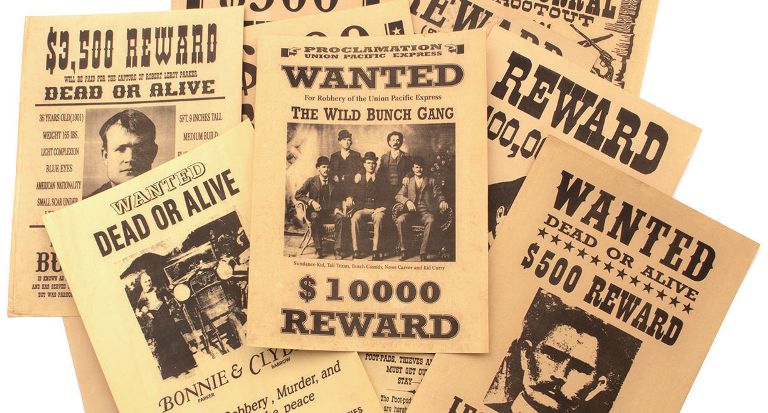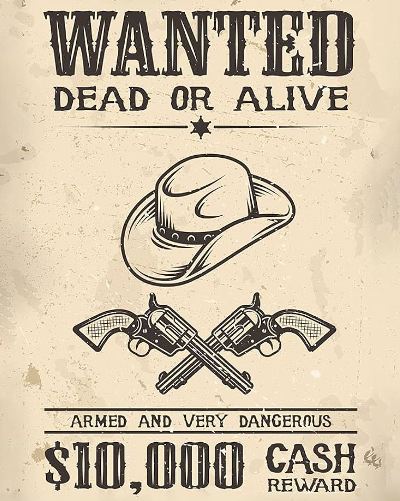
Think about the following questions.
1. What happens to criminals who escape to other countries or cities?
2. Besides police officers, who else can catch criminals?
3. Have you ever gotten money for returning something that was lost?
VOCABULARY PREVIEW
Match each New Academic Word List(NAWL) word with the correct definition.
- whereby
- monetary _____
- gravity _____
- locally _____
- skip _____
- nominal _____
- a. seriousness
- b. very small in amount
- c. (informal) to leave (a place) in a sudden and unexpected way, especially to avoid punishment
- d. relating to or occurring in a particular area, city, or town
- e. by which; according to which
- f. of or relating to money
BOUNTY HUNTERS

Sometimes criminals who run away from the police try to hide with the help of their friends and family. Others may flee1 to another country where the laws are different from the laws of their native country. In these cases, the government may offer a monetary reward, or bounty, for anyone who provides information that helps to catch the fugitive2. Sometimes the bounty is small-just a few thousand dollars. Other times, however, the reward can be quite large-up to several million dollars. In 2003, the US offered a $25 million bounty for Osama bin Laden. This was the largest reward ever offered by the US government. If a private citizen had aided in the capture3 of bin Laden, he or she would have become a very rich person.
Professional bounty hunters are a bit different. They do not just provide information to the authorities; they actually catch accused criminals themselves. Bounty hunters are not official members of the law-enforcement community, but they have a special role to play nonetheless. Their job is to find and arrest4 accused criminals who have skipped bail. "Skipping bail" is the term commonly used to describe the act of a person who is charged5 with a crime and then tries to run away. A person who skips bail is commonly called a "skip."
What is bail? For many situations in the US and Canada, people who are charged with a crime can make a deal whereby they temporarily6 give the court some money to stay out of jail until they must appear in court. This money is called bail. The amount of bail depends on the gravity of the crime and other factors. It may be a nominal amount, but it most commonly falls between $1,000 and $100,000.
Many of the accused cannot afford to pay the money themselves, so they borrow it. The person who lends the money is called a bail bond agent. If the accused person goes to court on the appointed date, then the bail bond agent gets his or her money back, plus a fee7. If the accused person misses the court appointment and runs away, then the bail bond agent loses the bail money.
This is where bounty hunters-also called bail enforcement agents-come in. Bounty hunters are hired by bail bond agents to find and catch skips who owe them money. They operates8 outside of jurisdictions, or legal boundaries, which means that they can go anywhere to catch a criminal, whereas most police can only operate locally. For example, the police in New York cannot go to California to arrest a skip, but bounty hunters can.
Sometimes skips are dangerous criminals charged with terrible crimes such as murder or rape, but most often, they are people accused of minor crimes, such as having drugs or failing to pay child support. Most states allow bounty hunters who have special licenses to arrest accused criminals, while a few do not allow this at all. Interestingly enough, in most states, licensed bounty hunters are legally allowed to break into the skip's home in order to arrest him or her. But Illinois, Kentucky, Oregon, and Wisconsin have laws against bounty hunting, and California has strict rules for the practice. For example, bounty hunters there are not allowed to enter a private home without permission.
New Academic Word List
- flee 1 : v. to run away; to escape
- fugitive 2 : n. a person who is running away to avoid being caught
- capture 3 : n. the act of taking and holding someone as a prisoner
- arrest 4 : v. to use the power of the law to take and keep someone, such as a criminal
- charge 5 : v. to formally accuse of a crime
- temporarily6 : adv. for a limited amount of time
- fee 7 : n. an amount of money that must be paid
- operate8 : v. to function or behave in a proper or particular way
READING COMPREHENSION
A ‣ Mark each statement as true (T) or false (F) according to the reading.
- A bounty is usually just a few hundred dollars.
- True
- False
- Bounty hunters lend accused criminals money for bail.
- True
- False
- "Bail enforcement agent" is another term for "bounty hunter."
- True
- False
- Bounty hunters may travel to different states to do their jobs.
- True
- False
- Bounty hunting is legal throughout the US.
- True
- False
B ‣ Choose the best answer according to the reading.
- What is the purpose of the reading?
- a. To argue that bounty hunters are important
- b. To describe the history of bounty hunters
- c. To explain what bounty hunters do
- d. To discuss why bounty hunters enjoy their jobs
- What is bail?
- a. The money collected by bounty hunters
- b. The money stolen by criminals
- c. The money offered as reward by the police
- d. The money given to the court by the accused
- Whom do bounty hunters work for?
- a. Accused criminals
- b. Bail bond agents
- c. The court
- d. The police
- What information is probably important for bounty hunters to know?
- a. The laws in different states
- b. Exchange rates for money in different countries
- c. The names of important police officers
- d. How bail amounts are decided
C ‣ Look for the answers in the reading and write them on the lines.
- What does it mean when an accused criminal "skips bail"?
_____ - What can licensed bounty hunters do in most states that other citizens cannot do?
_____
SUMMARY
Fill in the blanks with the phrases in the box.
- loses money
- monetary reward
- different jurisdictions
- accused criminals
- bail bond agent
- try to catch
The word "bounty" means a(n) 1 _____ offered for help in catching a criminal. For example, a $25 million bounty was offered to anyone who could help in catching Osama bin Laden. 2 _____ often pay bail in order to stay out of jail until their court date. They may borrow the money from a(n) 3 _____. Sometimes the accused person skips bail and runs away, and the bail bond agent 4 _____. Professional bounty hunters are people who 5 _____ these "skips." They are hired by bail bond agents and can work in 6 _____. Their work is legal in most states, but not all.
VOCABULARY PRACTICE
Fill in the blanks with the words in the box. Change the form if necessary.
- locally
- skip
- monetary
- nominal
- whereby
- gravity
- When William heard that the police were looking for him, he quickly _____ town.
- Considering the _____ of the situation, jokes are not appropriate.
- The company made a new policy _____ employees could earn bonuses for doing extra work.
- Sometimes, a murder is considered more serious if it is committed for _____ gain.
- If the lawyer's client is very poor, she only charges him or her a(n) _____ fee.
- Are you applying to universities far from home, or would you rather attend college _____?
SUPPLEMENTAL READING
Mackenzie Green, Bounty Hunter

Although bounty hunting is very dangerous work, it is a job that is not limited to men; some women are bounty hunters, too. Mackenzie Green is a very well-respected bounty hunter. In fact, she has been called the most successful bounty hunter in the US. Why is she so successful? She depends more on her brain than on physical strength. "A good bounty hunter relies on gut feelings and people skills to pick up information on the whereabouts of a skip," she says. This means that she trusts her feelings about people and situations to figure out if they are telling her the truth or if they are trying to hide something. She also doesn't carry a gun. "You can't tame a bull by hitting it with a stick," she says. This means that violence always leads to more violence. She prefers to use good people skills to get people to trust her—and then, when they least expect it, she arrests them.
When asked which qualities make a good bounty hunter, Mackenzie Green had this to say: "Being a bounty hunter is difficult work, and a person has to have experience in self-defense like judo and boxing, as well as a familiarity with weapons. A person also must be part detective to track down the skips, part lawyer to know what the different state laws allow, and part actor to try and get people to give you information that they otherwise wouldn't give out. A person must also be patient and lucky."
Fill in the blanks with information from the reading.
- Instead of _____, Green relies mostly on her brain.
- She does not _____ because violence only leads to more violence.
- According to Green, bounty hunters need to have the skills of a detective, a(n) _____ , and a(n) _____ .

Leave a comment
Load more